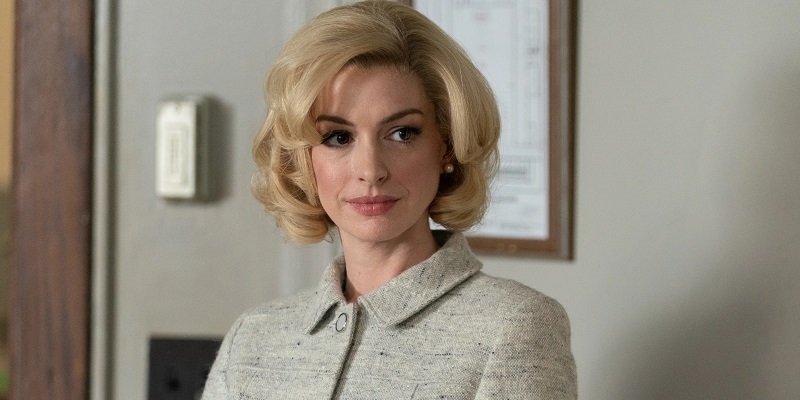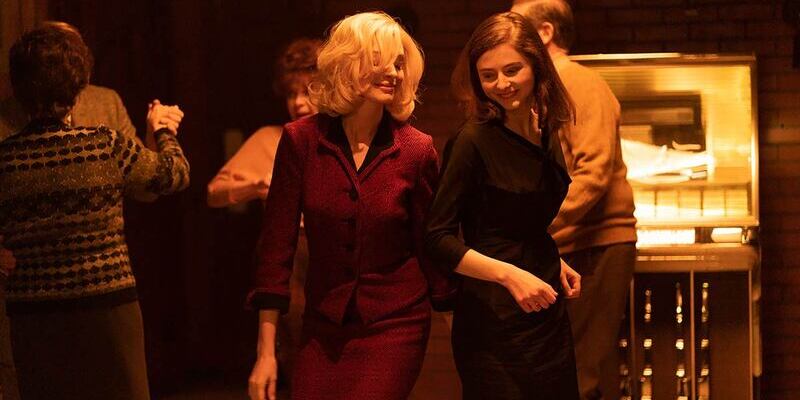
Review by
Eric Hillis
Directed by: William Oldroyd
Starring: Thomasin McKenzie, Anne Hathaway, Shea Whigham, Marin Ireland, Owen Teague

Paul Schrader described his script for Taxi Driver as the
story of a Protestant kid from the snow country who wandered into a New York
cathedral. William Oldroyd's adaptation of Ottessa Moshfegh's novel Eileen (the script is penned by Moshfegh and her
partner Luke Goebel) is something of a reversal of this idea. Here
the kid, Thomasin McKenzie's Eileen, is an Irish-American Catholic in
New England, with all the clichés you might expect of such a figure. She's
sexually frustrated and has to deal with an alcoholic ex-cop father (Shea Whigham). Sometimes Eileen fantasises about blowing her brains out with her
father's gun, or blowing his brains out. She doesn't wander into New York;
rather Manhattan sophistication wanders into her life.

Eileen works as a secretary at a prison for teenage boys. Her world is
shaken up by the arrival of a new counsellor, Rebecca (Anne Hathaway), a WASPy New Yorker with a Marilyn Monroe hairdo and the speech patterns
of Jennifer Jason Leigh's portrayal of Dorothy Parker. She's self-assertive
and stands up for herself when she becomes the object of unwanted male
attention. This is the glum early 1960s, when the decade was yet to swing,
and for Eileen, meeting a woman like Rebecca must be like hearing The
Beatles for the first time.
Eileen may be innocent and unworldly, but she's also smart. Rebecca seems
to see something in her, and the two become fast friends. In Rebecca's
company Eileen disguises her working class accent and begins wearing
lipstick and figure-hugging dresses. She would do anything for Rebecca, and
as the narrative progresses we get the sense that she may well be called
upon for such a favour.

If Eileen initially seems like a lesbian take on
Double Indemnity, with the infatuated Eileen being lined up as a patsy by Rebecca, this
idea is shattered as the two women gradually trade places. Eileen's
transformation from a shrew to a femme fatale is an echo of Kim Novak in
Vertigo, the difference here is how Eileen willingly goes along with the
metamorphosis. Unlike Jimmy Stewart, Rebecca doesn't have to exert a
dictatorial control over Eileen, who happily sheds her old skin and embraces
the possibilities of becoming the sort of woman Rebecca requires. In the
final act, when Eileen looks like she was born to wear blood red lipstick
and hold a pistol, Rebecca has lost her sophisticated apparel, clad in a
dowdy cardigan. Rebecca appears drained of energy, while Eileen has never
been more alive. It's as though a transfusion has occurred between the two
women.
Like Isabella Eklöf's
Holiday, Eileen could be viewed as the origin story of a
super-villainess. But like many origin stories, Eileen feels
like it's missing a third act. The film ends at the point where most noir
thrillers are set to ramp up the tension, leaving us to fill in the blanks
ourselves. It's a sign of how invested we've become in McKenzie's incredible
performance that we feel cheated by this ending. The young Kiwi star hinted
at this kind of range in the mediocre
Last Night in Soho, but here she's given a chance to explore a fully rounded character arc.
Hathaway has the less challenging of the two roles, but does a fine job in
imitating the classic femme fatales of mid 20th century Hollywood, even if
it is ultimately revealed as just that, an imitation on Rebecca's
part.

Oldroyd gave Florence Pugh her breakout role with a similar part to
McKenzie's in his striking directorial debut
Lady Macbeth. You expect McKenzie will get a similar boost from this, but let's hope
she goes on to choose more interesting roles than Pugh. We may have to
imagine what's next for Eileen, but we have decades of future performances
from McKenzie to look forward to.

